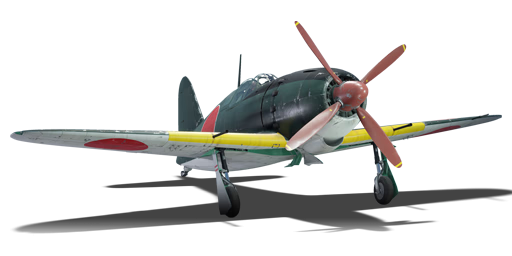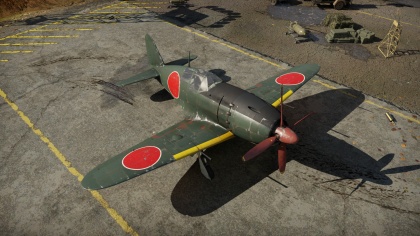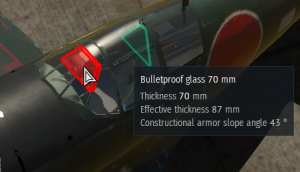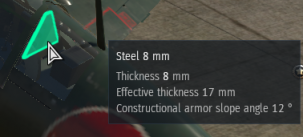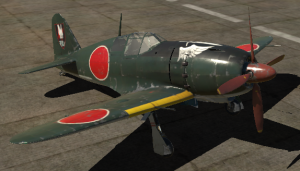Difference between revisions of "J2M2"
Colok76286 (talk | contribs) (→Media: Added Shooting Range episode) |
(→Media) |
||
| Line 247: | Line 247: | ||
[[File:J2M2.png|thumb|J2M2 in hangar w/ decals.|none]] | [[File:J2M2.png|thumb|J2M2 in hangar w/ decals.|none]] | ||
;Videos | ;Videos | ||
| − | {{Youtube-gallery|KqLoa0NIpzE|'''The Shooting Range #178''' - ''Pages of History'' section at 04:36 discusses the J2M "Raiden".}} | + | {{Youtube-gallery|KqLoa0NIpzE|'''The Shooting Range #178''' - ''Pages of History'' section at 04:36 discusses the J2M "Raiden".|9rpm13C84M0|'''IN THE NAME OF THUNDER!''' - ''Raiden'' section at 01:53 discusses the J2M's.}} |
== See also == | == See also == | ||
Revision as of 20:48, 11 June 2020
Contents
| This page is about the Japanese fighter J2M2. For other uses, see J2M (Family). |
Description
The J2M2 Raiden is a rank III Japanese fighter
with a battle rating of 5.3 (AB), 5.0 (RB), and 3.7 (SB). It was introduced in Update 1.49 "Weapons of Victory".
General info
Flight Performance
The J2M2 Raiden is an interceptor that excels in the Boom & Zoom play style. Once off the ground, the aircraft becomes an absolute monster, with a ludicrous climb rate, exceeding 20 meters per second, or close to 4,000 feet per minute of climb. This climb rate can be used to gain altitude and height over the enemy, and when they engage your slower, but much more manoeuvrable comrades flying Zeros, you swoop in and attack, which can be finished with quick bursts of the wing-mounted 20 mm cannons. Although half of your belt is next to useless when stock, a solid burst with upgraded belts has a good chance to critically damage, if not outright down, an enemy aircraft. The ammo load of 200 rounds is not large but provides enough to keep you fighting if one does not spray too much.
If one is unable to down an enemy quickly enough, the good energy retention in the vertical allows the craft to zoom back up to altitude for another attack. The aircraft does have some deficiencies, however. Its turning circle is closer to that of a P-51 or Fw-190, and in a sustained turn fight, it will lose energy and become a sitting duck. Compression becomes an issue at high speeds, and although faster than the majority of Japanese fighter aircraft, it still struggles to catch faster opponents, such as P-51s or P-47s. This can be countered by climbing at a high angle when in pursuit and then using that accumulated energy to close the gap and open fire.
The aircraft shares the same characteristics as the future J2M3 and M5 and can be a demo of what is there to come in the Japanese tree.
| Characteristics | |||||||
|---|---|---|---|---|---|---|---|
| Stock | |||||||
| Max Speed (km/h at 5,500 m) |
Max altitude (meters) |
Turn time (seconds) |
Rate of climb (meters/second) |
Take-off run (meters) | |||
| AB | RB | AB | RB | AB | RB | ||
| 569 | 551 | 11500 | 19.7 | 20.4 | 16 | 16 | 300 |
| Upgraded | |||||||
| Max Speed (km/h at 5,500 m) |
Max altitude (meters) |
Turn time (seconds) |
Rate of climb (meters/second) |
Take-off run (meters) | |||
| AB | RB | AB | RB | AB | RB | ||
| 626 | 596 | 11500 | 18.8 | 19.0 | 28.3 | 21.2 | 300 |
Details
| Features | ||||
|---|---|---|---|---|
| Combat flaps | Take-off flaps | Landing flaps | Air brakes | Arrestor gear |
| ✓ | ✓ | ✓ | X | X |
| Limits | ||||
|---|---|---|---|---|
| Wing-break speed (km/h) |
Gear limit (km/h) |
Combat flaps (km/h) |
Max Static G | |
| + | - | |||
| 520 | ~11 | ~9 | ||
| Optimal velocities | |||
|---|---|---|---|
| Ailerons (km/h) |
Rudder (km/h) |
Elevators (km/h) |
Radiator (km/h) |
| < 430 | < 460 | < 400 | > 324 |
| Compressor (RB/SB) | ||
|---|---|---|
| Setting 1 | ||
| Optimal altitude | 100% Engine power | WEP Engine power |
| 2,000 m | 1,875 hp | 2,100 hp |
| Setting 2 | ||
| Optimal altitude | 100% Engine power | WEP Engine power |
| 5,300 m | 1,675 hp | 1,876 hp |
Survivability and armour
Unlike other Japanese fighters, the J2M2 has some decent armour. There is a 70 mm bulletproof glass plate in front of the pilot. There is also a tiny triangular section of steel that is 8 mm behind the pilots head. Another thing the J2M2 has that other Japanese planes don't have near rank 3, is self-sealing fuel tanks. There is however no armour around the engine so the engine is very prone to bullets striking and damaging it.
Armaments
Offensive armament
The J2M2 is armed with:
- 2 x 20 mm Type 99 Model 2 navy cannons, wing-mounted (100 rpg = 200 total)
- 2 x 7.7 mm Type 97 navy machine guns, nose-mounted (550 rpg = 1,100 total)
The two 7.7 mm machine guns are mounted in the cowling of the aircraft serve as good backups if the cannons run dry, or if there is a need to poke a fleeing enemy into a manoeuvre, lest they are felled by a thousand strings of rifle fire.
Suspended armament
The J2M2 can be outfitted with the following ordnance:
- Without load
- 2 x 60 kg Navy Type 97 Number 6 bombs (120 kg total)
The two 60 kg bombs are enough to destroy light pillboxes in a pinch, or if your bombing skills are exceptional, you can use these bombs for precise targeting against tanks in ground RB, although the J2M2's lacklustre turn rate will be exacerbated by the low manoeuvre required in the game mode.
Usage in battles
In the start of a match, you'll want to use your best advantage, climbing. The J2M2 has an incredible rate of climb for it's BR of 4.3. This will almost always guarantee you an altitude advantage, and from there, you should pick out your targets one-by-one. The J2M2 does not have the best offensive guns so make sure to never head-on. If you are diving on an opponent and they are trying to head-on, break off and do a spiral climb. Your opponent (if he's greedy enough) will stay on you and lose all of his energy. Once you see him about to go into a stall, quickly dive down to him and shoot him down. Another advantage of the J2M2 is the top speed. The J2M2 can go very fast for its BR and you should use it to your advantage. One way you can use this is by doing Boom n' Zooms, but make sure to watch your speed. You don't want to go too fast to where you'll start to "lock-up" and have almost no authority of the controls.
Manual Engine Control
| MEC elements | ||||||
|---|---|---|---|---|---|---|
| Mixer | Pitch | Radiator | Supercharger | Turbocharger | ||
| Oil | Water | Type | ||||
| Controllable | Controllable Not auto controlled |
Controllable Not auto controlled |
Controllable Not auto controlled |
Separate | Controllable 2 gears |
Not controllable |
Modules
| Tier | Flight performance | Survivability | Weaponry | |
|---|---|---|---|---|
| I | Fuselage repair | Radiator | Offensive 7 mm | |
| II | Compressor | Airframe | New 7 mm MGs | |
| III | Wings repair | Engine | Offensive 20 mm | |
| IV | Engine injection | Cover | New 20 mm cannons | |
Pros and cons
Pros:
- Excellent climb rate (21.2 m/s spaded)
- Excellent top speed (592 kph / 370 mph)
- Easily outperforms other allied aircraft it usually faces
- Out turn most allied planes except for the Spitfire
- Small size
- Excellent dive characteristic, able to BnZ
- Does not bleed energy like the Zero
- More ammo for the 20 mm than the early Zero models
- Comes with the ability to carry bombs when stock
- 20 mm does a lot of HE damage
- Has armour and self-sealing fuel tanks
- Very capable plane at almost any situations
- Incredibly favourable matchmaking in Arcade Battles for such a capable plane
Cons:
- Requires proper knowledge of the game to use its advantage
- Slower than US planes
History
Describe the history of the creation and combat usage of the aircraft in more detail than in the introduction. If the historical reference turns out to be too long, take it to a separate article, taking a link to the article about the vehicle and adding a block "/ History" (example: https://wiki.warthunder.com/(Vehicle-name)/History) and add a link to it here using the main template. Be sure to reference text and sources by using <ref></ref>, as well as adding them at the end of the article with <references />. This section may also include the vehicle's dev blog entry (if applicable) and the in-game encyclopedia description (under === In-game description ===, also if applicable).
Media
- Images
- Videos
See also
Links to the articles on the War Thunder Wiki that you think will be useful for the reader, for example:
- reference to the series of the aircraft;
- links to approximate analogues of other nations and research trees.
External links
Paste links to sources and external resources, such as:
- topic on the official game forum;
- encyclopedia page on the aircraft;
- other literature.
| Mitsubishi Company (三菱商会) | |
|---|---|
| Fighters | A5M4 · Hagiri's A5M4 |
| A6M2 mod. 11 · A6M2 · A6M3 · A6M3 mod. 22 · A6M3 mod. 22Ko · A6M5 · A6M5 Ko · A6M5 otsu · A6M5 Hei · A6M6c | |
| A7M1 (NK9H) · A7M2 | |
| J2M2 · J2M3 · J2M4 Kai · J2M5 · J2M5 (30 mm) | |
| Hydroplanes | F1M2 |
| Interceptors | Ki-83 · Ki-109 |
| Bombers | G4M1 |
| Ki-21-Ia · Ki-21-I hei · Ki-67-I Ko · Ki-67-I otsu | |
| Jet Fighters | Ki-200 |
| Captured | ▃A6M2 · ␗A6M2 |
| See also | Mitsubishi Heavy Industries, Ltd. (Post-War) |
| Japan fighters | |
|---|---|
| Navy | |
| Carrier-based fighter | |
| A5M | A5M4 · Hagiri's A5M4 |
| A6M | A6M2 mod. 11 · A6M2 · A6M3 · A6M3 mod. 22 · A6M3 mod. 22Ko · A6M5 · A6M5 Ko · A6M5 otsu · A6M5 Hei · A6M6c |
| A7He | A7He1* |
| A7M | A7M1 (NK9H) · A7M2 |
| Land-based Fighter | |
| J2M | J2M2 · J2M3 · J2M4 Kai · J2M5 · J2M5 (30 mm) |
| J6K | J6K1 |
| J7W | J7W1 |
| N1K-J | N1K1-Ja · N1K2-J · N1K2-Ja |
| Fighter seaplane | |
| N1K | N1K1 |
| A6M-N | A6M2-N |
| Army | |
| Ki-10 | Ki-10-I · Ki-10-I C · Ki-10-II · Ki-10-II C |
| Ki-27 | Ki-27 otsu · Ki-27 otsu Tachiarai |
| Ki-43 | Ki-43-I · Ki-43-II · Ki-43-III otsu |
| Ki-44 | Ki-44-I · Ki-44-I 34 · Ki-44-II otsu · Ki-44-II hei |
| Ki-61 | Ki-61-I ko · Ki-61-I otsu · Ki-61-I hei · Tada's Ki-61-I hei · Ki-61-I tei · Ki-61-II Otsu Kai |
| Ki-84 | Ki-84 ko · Ki-84 otsu · Ki-84 hei |
| Ki-87 | Ki-87 |
| Ki-94 | Ki-94-II |
| Ki-100 | Ki-100 · Ki-100-II |
| Other countries | ▅F4U-1A · ▅P-51C-11-NT · ▅Bf 109 E-7 · ▅Fw 190 A-5 |
| *Imported designation of the He 112 (A6M was in development - A7M would take A7 designation after the cancelation of the A7He) | |


